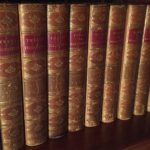Recently one of the dozen visiting fellows and postdocs we’re hosting this year at Princeton’s James Madison Program suggested the formation of an informal reading group (via Zoom, as these days it must be) devoted to Jane Austen’s Emma. I readily agreed to join the group, not only because it has been thirty years since I first read the novel, but because earlier this year I have already reread Pride and Prejudice and Sense and Sensibility—and read Northanger Abbey for the first time. Continuing an Austen kick in the Age of Covid feels right. As Chief Justice John Marshall wrote of “Miss Austen” to Justice Joseph Story in 1826, “Her flights are not lofty, she does not soar on eagle’s wings, but she is pleasing, interesting, equable, and yet amusing.” She and her novels, even if one has read them just once before, seem like old friends, and her penetration into the human character far transcends the social milieu of her characters’ lives.
The pleasure of rereading Emma got me thinking about the whole business of repeated readings of the books in one’s life. As a college teacher who will mark in January the fortieth anniversary of the first course I ever taught, I’m familiar with the experience of repeatedly reading some of the central works in my discipline. I have read more times than I can say, in the company of students, Plato’s Republic (in whole or in part), the “greatest hits” of The Federalist (and twice the series as a whole), and other works of political philosophy and American political thought, as well as notable Supreme Court decisions that form the “canon” of constitutional law. Repetition is a teacher’s lot in life, especially if one is persuaded that certain works have a permanent importance.
But rereading for pleasure is another thing. Sometimes I have a guilty feeling about it. I’ve read Tolkien’s The Lord of the Rings trilogy three times, and sometimes think I shan’t ever again. There are so many books still to read for the first time, and life is short. Shouldn’t I eschew rereading the familiar, and venture into strange new territory? After all, my home library has an embarrassingly great number of books I have not yet read! (I’ll name some of those “plan to read” books next time.)
But then the old friends beckon from their shelves, and like our best human friends, promise that if we greet them when we are not very presentable, or thoughtful, or even terribly attentive, it will be quite all right. And as we settle into our familiar slouch with them, they promise, again like our human friends, to reveal more of themselves on a further acquaintance, to teach us more about the humanity of which they are a representative sample, and to deepen our affection for them.
Start your day with Public Discourse
Sign up and get our daily essays sent straight to your inbox.Already in previous editions of this column I have named authors and books that have become the “rereads” in my life—Alexandre Dumas and Patrick O’Brian among them, and Alfred Bester, and of course P. G. Wodehouse. Twain is another; it may be time soon to read The Adventures of Huckleberry Finn again, notwithstanding its less than satisfactory ending, but precisely because this is a book that ideologues want to “cancel” nowadays. Evelyn Waugh is also on my list; I’d like to reread his best work, the Sword of Honour trilogy. And am I right to recall Brideshead Revisited with disappointment by comparison? Rereading it may change my mind.
When my wife and I moved a distance of 500 miles a decade ago, we parted with a great many of what I called “ephemeral” books—those that neither of us reasonably expected to read again, even if we had enjoyed them. But we brought with us a great many more. There among the “keepers” on a nearby shelf, for instance, is Arthur Koestler’s little-known novel The Call Girls, a splendid send-up of intellectuals flying to international conferences to save the world. Will it be as enjoyable a second time around? I kept it in order to find out. (Oh, to think what Koestler would have made of the jet-setting climate alarmists.) Also over there is Turgenev’s Fathers and Sons, which I haven’t read since college. Why did I keep it? Because a memory lingers that makes it worth rereading one day. And across the room from Koestler and Turgenev is the best book on acting that I know, Alec Guinness’s memoir Blessings in Disguise, which is definitely worth rereading.
And why do I not still have copies of Flaubert’s Madame Bovary and Stendhal’s The Red and the Black? Because while I recognize what makes them canonical literature, I just don’t think I would ever read them again. Your results may differ, but that’s the point. If readers were not rereaders, they would promptly give away every book they owned once they’d read it, or buy no books at all, merely relying on public libraries. But we generally keep more than we dispose of, storing up new books faster than we can read them, and yet still turning to reread those books that gave us the most pleasure or did our minds the most good.
I guess that’s the true reason for keeping and rereading our own peculiar favorites. I have called books and authors “friends,” and that they are. Aristotle tells us the highest form of friendship is that which aims at another’s good as though it were one’s own, for in truth it is indistinguishable from one’s own. We reread our favorite books in gratitude, not only for the repeated pleasure of the experience but to know once again the good that our old friends have selflessly done us. I think Miss Austen would understand.
A note to readers: This is the twentieth “Isolation Bookshelf” (or “Isolation Cinema”) column, a feature that began weekly in April and became biweekly in June. I will now be writing these columns on a monthly basis. You’ll see it again in late November.













